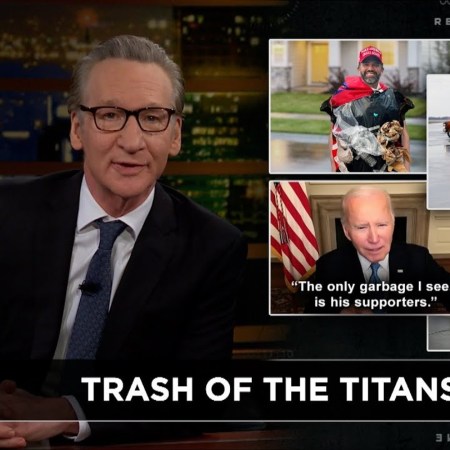We’re now three episodes into a new season of Real Time With Bill Maher, and a number of themes for this season are coming into focus. Chief among them is Maher’s embrace of what a recent The Atlantic article called the “vaxxed and done” approach to the pandemic, followed by Maher’s critique of the Republican Party for its increasing authoritarian tendencies and of the American left for — for lack of a better word — “wokeness.”
Admittedly, these last two have been steady concerns of Maher’s. But this week’s episode ventured into some less familiar territory — notably, the Winter Olympics, when, in Maher’s words, “we all come together to celebrate the human spirit under quarantine and a police state.” It wasn’t the only competitive sports reference in the opening monologue. Maheralso brought up the fact that NASCAR is racing in Los Angeles. Maher dubbed the event “something we’ve never seen before — traffic moving!”
Elsewhere in the monologue, Maher commented on the economy adding jobs — about which he quipped that “[a] lot of those jobs were Fox News guests talking about how bad the economy is.” From there, he continued to critique the Republican Party, noting the RNC’s recent censure of Liz Cheney and Kinziger. Maher pointed out that he’s a frequent critic of the left, but that his concerns about the Republican Party far exceeded his criticism of the Democrats. In his words, the GOP has become “a party that is just about having a creepy fealty to one man. They’re not Republicans anymore — they’re like BTS fans.”
Representative Ro Khanna was the first guest, there to discuss both his work in Congress and his new book Dignity in a Digital Age. Khanna spoke about the importance of dialogue across ideological lines, and brought up his willingness to go on Fox News. But he also addressed the recent conservative-led actions against Maus and Toni Morrison’s fiction in schools, making a brief but impassioned case that this was a far more alarming instance of “cancel culture” than what people generally associate with the term.
Maher, though, wanted to focus on what the Dems were doing; citing the likelihood that Republicans would take control of one or both houses of Congress, he asked Khanna what the Democrats had planned for the next year. Khanna, who is 45, spoke of being somewhat shocked by certain aspects of the world today. “Growing up,” he said, “I never thought that I’d have to fight the same fights that were fought in the 1960s.” And he made the case for bipartisan efforts to nurture tech jobs in Appalachia. “Can this country really prosper if all of those tech jobs are in Silicon Valley, New York or Austin?” he said. It was a wide-ranging segment, but Khanna got his points across on a number of disparate issues.
For the night’s panel, Stolen Focus author Johann Hari and Reason editor Katherine Mangu-Ward joined Maher. Hari’s new book and its questions around losing focus prompted Maher to ask a simple question: why can’t we have a normal brain? Hari spoke about the process of researching his book, and the experts he’d spoken to who told him that different factors can make one’s ability to focus better or worse. These days, Hari said, the ones that make it worse are ascending. He said that he’d thought technology would be the biggest factor — but wasn’t not the only one. He also mentioned sleep and food; soon, the momentum carried the discussion elsewhere.
Mangu-Ward was more skeptical, and asked if Hari’s analysis was more centered around older methods of doing things as opposed to how they’re done today. Hari pushed back against this, citing the work of MIT neuroscientist Earl Miller. Hari dubbed the present moment a “perfect storm of cognitive degradation.” Mangu-Ward pushed back, saying, “It can’t always be the apocalypse!”
Maher staked out his own position here on Team Apocalypse. Mangu-Ward, in turn, argued that being alarmist about technology was hewing to “an older way of the world.”
“That’s a cheap shot,” Maher said. Mangu-Ward when on to speak of the “transition costs” of technology, while Hari noted that there are ways to address loss of attention on a societal level, citing the example of the effort to remove lead from gasoline. Hari made the argument for fighting for this; Maher was more “skeptical,” as he was regarding Build Back Better.
Conversation later turned to the Winter Olympics, with both guests speaking of their frustration with the Chinese government’s surveillance technology, among other things. Hari also spoke of his anger at the IOC for a host of things. “They’re a repulsive organization that should be disbanded and started again,” Hari said.
The panel concluded with discussion of the recent controversies over Whoopi Goldberg on The View and Jeff Zucker’s exit from CNN — with a bit of Spotify talk as well. (Earlier in the episode, Maher alluded to Crosby, Stills & Nash’s “Suite: Judy Blue Eyes, reference which all of two people in the audience got.) Addressing the situation on The View. Maher was frustrated by the action taken by the show to suspend Goldberg. He noted that he disagreed with her, but also recognized their differences in perspective.
The evening’s most engaging discussion came during Overtime. An audience question led to a spirited debate on drug legalization, with Hari pointing to various countries’ methods of legalizing different drugs as a way to reduce fatalities. Maher pivoted from a comment Hari made on the subject of legally owning a lion to tell the story of a Christmas party he’d attended in Los Angeles that featured a live camel and a live tiger. Maher — who, he pointed out, is a PETA board member — got riled up about this; the tale also featured a cameo appearance by a certain actor-turned-California politician. (No, not Clint Eastwood.)
The opening of New Rules found Maher opting for big targets. “The whole ‘Let’s Go Brandon’ thing really isn’t that clever,” he pointed out. Maher is, like many observers, baffled by Oli London’s contemplation of penis reduction surgery. But the bulk of the segment related to COVID — and the idea that, basically, it was time to target preventive measures on the most at-risk populations and have a return to normalcy for everyone else. (“I haven’t been to my office in two years,” he said at one point.) Though, Maher being irreverent as ever, it also contained the phrase “handjobs in a hazmat suit.”
Maher cited his skepticism of certain elements of the pandemic response by summoning up memories of the medical establishment’s response to AIDS in the late 1980s. And he shifted back and forth between objecting to specific policies to expressing a broader frustration with the medical establishment. This wide-ranging approach was ironic, given that Maher began the segment by using a metaphor of pinpoint targeting. Earlier in the episode, Maher gave a glimpse of what audiences could expect from future episodes; it begs the question of whether we’ll see more “vaxxed and done” dialogues in the coming weeks.
Thanks for reading InsideHook. Sign up for our daily newsletter and be in the know.


















